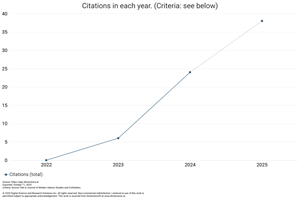Building Holistic Education: Lessons from Al-Ghazali for the Modern Era
DOI:
https://doi.org/10.59653/jmisc.v2i03.1058Keywords:
Education, al-Ghazali, ModernAbstract
This study describes al-Ghazali's thoughts on Islamic religious education. Where al-Ghazali's thoughts in the field of education emphasize more that education is a way to bring his servants closer to Allah SWT, with the main goal of obtaining happiness both in this world and in the hereafter and this will be very useful in fast-paced times, in seeking a information, because in this day and age many people are more concerned with high intelligence education with the hope that the smarter a person is, the more successful that person will be in the future. However, society forgets that in life it does not only require high intelligence, but also requires qualified ethics, and this will be obtained by someone by getting closer to the Creator. The method used in this research is library research, the author conducts an assessment of al-Ghazali's thoughts in viewing Islamic education through various related books and journals, which makes it easier for the writer to complete this research.
Downloads
References
budiarti, E., Aini, R. E., & Kamiilda. (2022). Relevansi Pendidikan Islam Al-Ghazali Terhadapgrowth Mindset Generasi Z Pada Masa Covid-19. Ta’limuna, 11, No. 01 Maret, 1–10.
Febrani, R. (2021). Pemikiran Pendidikan Al Ghazali Dan Relevansinya Dengan Pendidikan Anak Usia Sekolah Dasar. IAIN Bengkulu.
Kulsum, U., & Muhid, A. (2022). Pendidikan Karakter melalui Pendidikan Agama Islam di Era Revolusi Digital. Intelektual: Jurnal Pendidikan Dan Studi Keislaman, 12(2), 157–170. https://doi.org/10.33367/ji.v12i2.2287
Mighfar, S. (2023). Islamic Parenting Perspektif Imam Al-Ghazali. Atthufulah : Jurnal Pendidikan Anak Usia Dini, 3(2), 119–130. https://doi.org/10.35316/atthufulah.v3i2.2972
Munardji. (2024). Ilmu Pendidikan Islam. PT Bina Ilmu.
Nata, A. (2016). Ilmu Pendidikan Islam. Prenada Media. https://books.google.co.id/books?id=orJADwAAQBAJ
Nurdin, M. (2008). Kiat Menjadi Guru Profesional (1st ed.). Ar-Ruzz Media.
Patoni, A., & Ramayulis, H. (2004). Metodologi pendidikan agama Islam. Kalam Mulia. https://books.google.co.id/books?id=DYP5jwEACAAJ
Pristiwanti, D., Badariah, B., Hidayat, S., & Dewi, R. S. (2022). Pengertian pendidikan. Jurnal Pendidikan Dan Konseling (JPDK), 4(6), 7911–7915. https://doi.org/10.31004/jpdk.v4i6.9498
Ramadani, F., Neviyarni, & Desyandri. (2023). Studi Literatur ;Analisis Tujuan Pendidikan Terhadap Kurikulum Merdeka Belajar Dalam Menghadapi Tantangan Pendidikan Era Revolusi Industri 4.0. Jurnal Ilmiah Pendidikan Dasar, 8(1), 321–332.
Ramli, M. (2022). Pemikiran Pendidikan Muhammad Athiyah Al-Abrasyi. TA’DIBAN: Journal of Islamic Education, 2(1), 43–57. https://doi.org/10.61456/tjie.v2i1.34
Sa’diyah, M., Anwar, K., & Siregar, N. A. (2022). Pemikiran Muhammad Athiyah Al-Abrasyi Tentang Pendidikan Islam. ANSIRU PAI : Pengembangan Profesi Guru Pendidikan Agama Islam, 6(2), 258–265. Ahttp://jurnal.uinsu.ac.id/index.php/ansiru/article/download/17201/7258
Setiawan, E. (2015). Tinjauan Pendidikan Menurut Pandangan Al-Ghazali. J-PAI: Jurnal Pendidikan Agama Islam, 2(1).
Shofan, M. (2004). Pendidikan Berparadigma Profetik : Upaya kontruktif membongkar dikotomi sistem pendidikan Isalm. UGM Press.
Suwarno, S. (2020). Studi Agama Islam Melalui Pendekatan Interdisipliner. Dar El-Ilmi: Jurnal Studi Keagamaan, Pendidikan Dan Humaniora, 7(2), 140–154. https://doi.org/10.52166/darelilmi.v7i2.2178
Downloads
Published
How to Cite
Issue
Section
License
Copyright (c) 2024 Kholil Chusyairi

This work is licensed under a Creative Commons Attribution-ShareAlike 4.0 International License.
Authors who publish with this journal agree to the following terms:
- Authors retain copyright and grant the journal right of first publication with the work simultaneously licensed under a Creative Commons Attribution-ShareAlike that allows others to share the work with an acknowledgement of the work's authorship and initial publication in this journal.
- Authors are able to enter into separate, additional contractual arrangements for the non-exclusive distribution of the journal's published version of the work (e.g., post it to an institutional repository or publish it in a book), with an acknowledgement of its initial publication in this journal.
- Authors are permitted and encouraged to post their work online (e.g., in institutional repositories or on their website) prior to and during the submission process, as it can lead to productive exchanges, as well as earlier and greater citation of published work (See The Effect of Open Access).
























